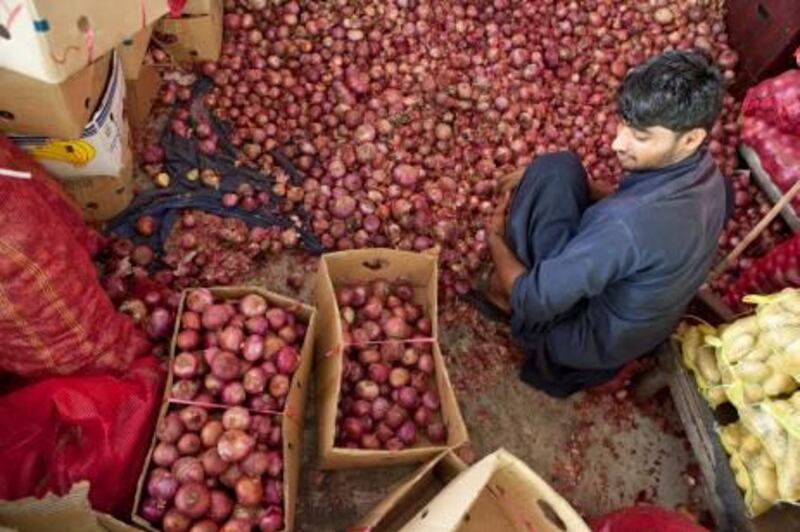DUBAI //Shoppers had to pay almost 4 per cent more for fresh food in June than they did the previous month.
Video: Three diverse families share their reactions to rising food prices
The parents, UAE residents from different ethnic backgrounds, talk about feeding their families as the contents of their shopping trolleys rise. Video by Paul O'Driscoll & Deepthi Unnikrishnan.
The Dubai Fresh Food Price Index showed an overall month-on-month increase of 3.9 per cent for fresh fruit, vegetables, meat, fish and seafood.
The rise reflects global increases and seasonal movements in food prices, according to the Dubai Chamber of Commerce and Industry, which drew up the index.
Yesterday the UN Food and Agriculture Organisation said world food prices rose sharply last month and almost reached the record highs seen in February.
The chamber has produced the index since 2005 but only started releasing the monthly figures to the public in May. Before then the figures were used internally.
"The 3.9 per cent month-on-month rise is mainly due to significant increases in the prices of fresh fish and seafood and of fresh vegetables," said Dr Belaid Rettab, the senior director of the chamber's economic research and sustainable business development sector.
"Seasonally, prices of fresh fish and seafood and vegetables rise during the summer months. Since a significant part of supply is imported, global conditions are also important factors in determining prices."
The head of a supermarket chain also attributed food inflation to exchange rate moves.
The price of fish and seafood soared by 8.5 per cent month-on-month in June, while vegetables cost 8.2 per cent more. Meat rose by 3.3 per cent, but fruit prices were 2.7 per cent down.
"The price index system provides information about how prices of commodities have been moving over time," Dr Rettab said. "Given that food accounts for a large proportion of households' expenditure, price movements of food items indicate areas of pressure on household budgets."
Overall, fresh food prices were up 5 per cent year-on-year last month, with vegetables up 9.6 per cent, fruit 7.7 per cent and meat 3.1 per cent. The cost of fresh mango rocketed by 52.7 per cent year-on-year, while peppers showed the highest rise in the vegetable category at 25 per cent. In contrast, fish and seafood cost 1 per cent less.
The index is based on 595 price quotations for fresh food items collected each month from the main fish and vegetable market, major hypermarkets and smaller grocery shops.
The methodology used follows the international standards for consumer price indexes laid down by the International Monetary Fund and International Labour Office.
Shoppers said they were only too aware of the recent increases.
“Fish seems to have gone up, everything has just been sliding up over recent months,” said Sue Strickland, who lives in Dubai with her husband and 16-year-old son. “The prices of some types of fruit are horrendous.
“It means I eat out more because I add up my bill and it costs as much to cook it, and then I think, ‘Oh, I’ll go out’, and I don’t have to do the washing up. So it means I eat very badly.”
Zeina Mandour, who works for an electronics company, said: "Prices have gone up. When you do your shopping regularly you get used to what things cost, and if you compare something that used to cost Dh4 a kilo, now it's a lot more. And food is much more expensive here compared to other countries in the region."
Ahmed Bader Al Budoor, a property company chairman, said he kept his household grocery bill under control by shopping at a co-operative where, as a shareholder, he received an annual dividend.
“Last year my total family bill was around Dh62,000, and they gave me Dh6,000 back, so I’d rather go there to shop as I get something back.”
Spinneys chief executive Johannes Holtzhausen said: “One of the biggest drivers of food inflation this year was the exchange rate. We import produce from Europe, and when the euro exchange rate goes from US$1.20 (Dh4.4) to $1.45 (Dh5.3) that makes a huge difference to the cost of importing the produce.”
V Nandakumar, a spokesman for LuLu, said that over the past five years the hypermarket chain had cut its reliance on local markets by greatly increasing the amount of produce it imported directly from suppliers overseas.
“This helps us to keep prices level or bring them down compared with the local market,” he said. “But because a lot of produce is imported, any price fluctuations in international markets definitely get imported along with the products.”






